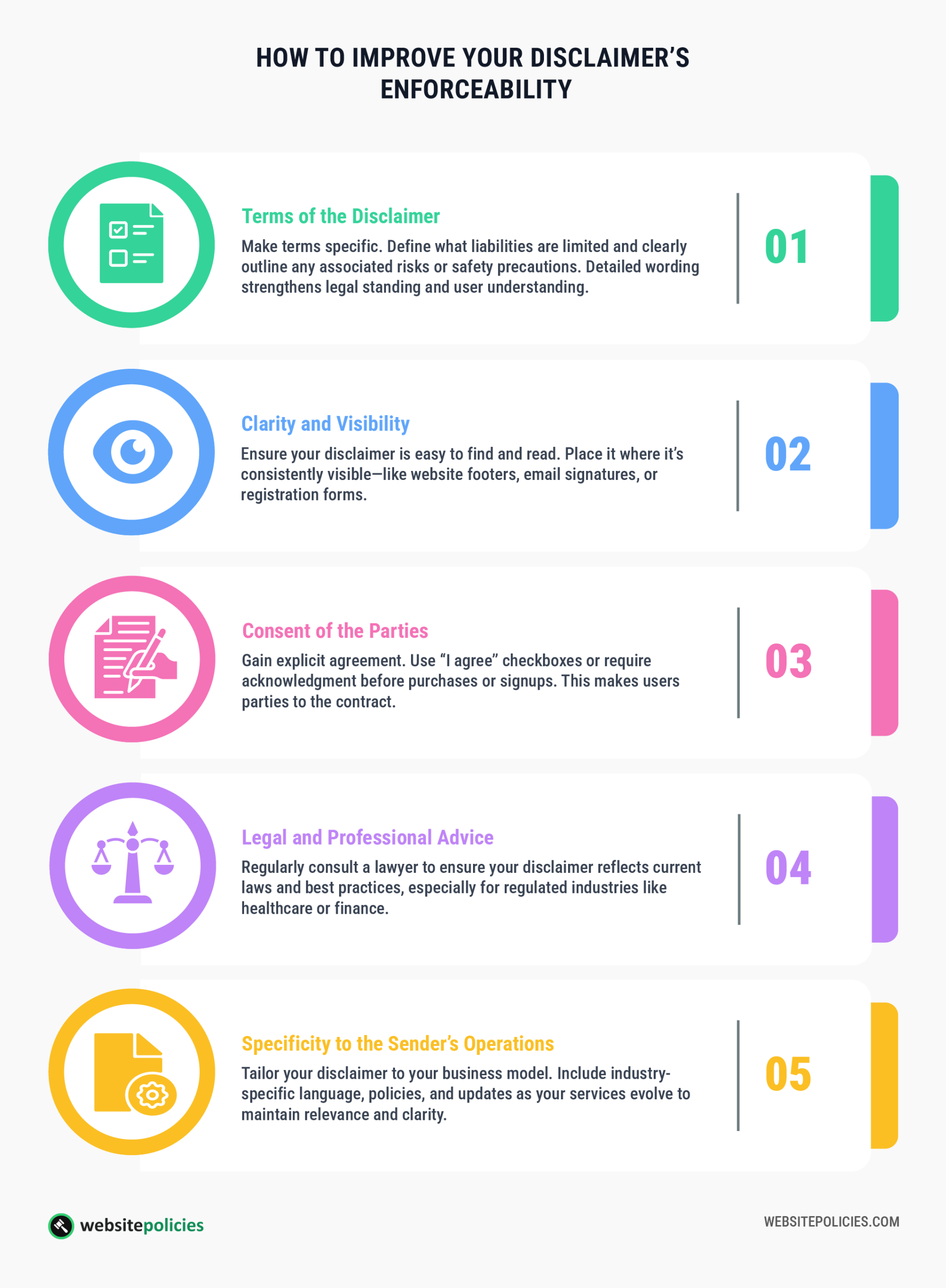When you run an online business, learning how to deal with potential legal issues is part of the job. One element that helps protect your business is a disclaimer.
While not every website is legally obligated to have disclaimers, skipping them could land you in hot water if something goes wrong.
Whether you’re running a personal blog or an e-commerce site, knowing when and why you need a disclaimer can save you from potential legal headaches.
Below, I’ll talk about what makes a disclaimer enforceable and offer steps to ensure yours is legally sound.
- Your disclaimer should clearly outline liabilities and associated risks that need to be enforceable.
- Ensure you regularly consult legal experts to keep your disclaimer compliant with current laws.
- Remember, a disclaimer can limit but not eliminate all legal liabilities you might face.
Table of Contents
PRO TIP: Take the hassle of writing your own disclaimer away with our disclaimer generator trusted by over 200,000 businesses. It’ll save you hours of work and possible costly legal mistakes.
Is a Disclaimer Legally Binding?
Yes, disclaimers are generally legally binding, but there are specific conditions they must meet to be considered legally valid.
Essentially, a disclaimer serves as a waiver, which users implicitly agree to by using your site—even if you don’t require them to click an acceptance button.
For a disclaimer to function as a binding agreement, it must be clearly communicated and reasonable. Additionally, it also should not violate any existing laws. Ensuring these elements can help establish your disclaimer as a strong legal shield.
Disclaimers are generally enforceable if they are clear, unambiguous, and not unduly harsh or unfair. It depends on specific wording, how it’s presented, and the applicable laws.
Are Online Disclaimers as Binding as Printed Ones?
The short answer is mostly yes. While the type of disclaimer (online or printed) can affect its enforceability to some extent, the primary factors remain the same: clarity, conspicuousness, and consideration.
For example, if you received an email and any attachments from a law firm, you might have noticed a separate disclaimer stating that the content does not create an attorney-client relationship.
Similarly, when you purchase a product online, the terms of service often include a disclaimer designed to limit liability and bind the recipient to certain conditions.
In both cases, the effectiveness of online and printed disclaimers in legally binding someone depends on how clearly and prominently these disclaimers are communicated.
PRO TIP: Use disclaimers in a way that makes them easily noticeable and understandable. This way, all parties are aware of the terms to which they are agreeing.
What Makes Disclaimers Enforceable?
A disclaimer is enforceable when it meets certain legal criteria. Note that disclaimers can vary, but key elements determine their validity.
- The language used must be clear, straightforward, and easily understandable. For instance, a standard disclaimer stating that a website’s content is for informational purposes should not use technical jargon that could confuse the reader.
- Users must have a chance to review and agree to its terms either by continued use or explicit acceptance, like checking a box when signing up for a service.
- A specific disclaimer must not infringe upon the users’ inherent legal rights. For example, a disclaimer attempting to waive all liability for negligence might not hold up in court if it strips the user of essential protections.
- There should be an agreement between the sender and receiver acknowledging the disclaimer. This can be formal as a signed contract or as simple as a statement attached to the bottom of a newsletter.
How To Improve Your Disclaimer’s Enforceability
Ensuring your disclaimer is enforceable requires careful attention to detail and a clear understanding of legal principles. Here are some practical tips that can help strengthen its effectiveness:

Terms of the Disclaimer
The terms of the disclaimer should be explicit and specific. This involves clearly defining what liabilities are being limited and what potential risks are associated.
For example, a product’s disclaimer should outline specific safety precautions and highlight any product liability issues. To give you an idea of how that can be worded, here’s a snippet of The Foot Collective’s product disclaimer:

This disclaimer clearly articulates the specific safety precautions and risks associated with their products. In doing so, it helps set clear expectations and informs consumers effectively.
This level of detail and clarity not only enhances understanding but also strengthens the disclaimer’s legal enforceability.
Clarity and Visibility
A disclaimer must be easily noticeable and understandable to all parties involved. For instance, placing it in an email footer ensures visibility each time communication is sent, making it more likely that the recipients agree to the terms.
Consent of the Parties
It is essential that all parties involved explicitly agree to the terms presented. In running my business, I do this by requiring users to click an “I agree” checkbox before making a purchase or signing up for a service, effectively making each user a party to a contract.
Legal and Professional Advice
Regularly consult with law firms or seek professional advice to ensure your disclaimer complies with current laws and covers all necessary aspects of liability arising from unintended use or misunderstanding.
This is important, particularly in fields requiring high legal diligence like legal services, healthcare, or finance. Take a look at this legal disclaimer from Robinson Bradshaw, for example:

This disclaimer addresses the specific legal intricacies associated with the provision of professional services.
It clearly delineates the boundaries of the legal advice offered. In turn, users understand that an attorney-client relationship is not created without formal engagement.
Specificity to the Sender’s Operations
Tailor the disclaimer to reflect the specific operations and contexts of the sender’s business. This includes detailed policies for non-disclosure, data usage, or any other specific conditions related to the business’s operations.
In my practice, I’ve found that incorporating industry-specific language into disclaimers can preempt potential misunderstandings and reduce legal ambiguity.
I also make it a point to regularly revisit and update these disclaimers as my business evolves, ensuring they stay relevant to new products or services.
Do Disclaimers Hold Up in Court?
The courts may not uphold disclaimers in situations that involve unfair or deceptive practices. While disclaimers provide a degree of protection, their enforceability can vary depending on specific circumstances.
For example, under the Unfair Contract Terms Act 1977 in the UK, disclaimers that attempt to exclude or restrict liability for any damage or loss may be deemed unfair and unenforceable if they are not reasonable in all circumstances.
PRO TIP: If possible, seek legal advice when drafting a disclaimer. Doing so guarantees that it is not only legally sound but also effective in the contexts it is meant to address.
Global Perspectives and Regulations
If you intend to operate your business on a global scale, you need to understand how disclaimers are viewed under different legal systems. Here are laws in various countries that answer whether or not disclaimers are legally binding:
United States
In the U.S., disclaimers are often employed to limit liability and inform users of potential risks—serving as constructive notice. They must be clearly presented and reasonable to be enforceable.
Disclaimers that attempt to absolve a party of all duty of care or those related to death or personal injury often face legal scrutiny and might not be upheld in court.
Canada
Canadian law also recognizes disclaimers as a way to mitigate legal action. However, like in the U.S., there are strict regulations when it comes to disclaimers that involve negligence or personal injury.
For a disclaimer to be enforceable in Canada, it must be reasonable and should not contravene public policy.
United Kingdom
UK law demands that disclaimers be fair and explicitly clear to all parties involved. As I mentioned earlier, disclaimers are required to meet stringent standards under the Unfair Contract Terms Act 1977, particularly when excluding or restricting liability for death or personal injury.
Australia
Australian law places a strong emphasis on consumer protection, strictly regulating how disclaimers are required and enforced. Disclaimers must not contravene the Australian Consumer Law, especially provisions that relate to misleading or deceptive conduct.
The enforceability of a disclaimer will largely depend on whether it is considered fair and reasonable, particularly in cases involving duty of care or consumer rights.
Each country’s approach to disclaimers highlights the balance between protecting business interests and upholding consumer rights. Clear, fair, and reasonable terms ensure enforceability.
Frequently Asked Questions
Do disclaimers need to be signed to be legally binding?
No, disclaimers do not always need to be signed to form a legally binding contract. Acceptance can also be indicated through continued use or explicit agreement online.
Are email disclaimers legally binding?
Email disclaimers can be legally binding, but enforceability varies. An email disclaimer cannot override mandatory legal obligations.
Does a disclaimer need to be notarized?
No, a disclaimer does not need to be notarized to be valid. It can be legally binding even if you don’t have it notarized.
Can I use a disclaimer to avoid responsibility for errors on my website?
Yes, a disclaimer is a legal statement that can limit liability for errors on your website. However, it must be clear and reasonable.
Can a disclaimer fully protect me from legal liability?
No, a disclaimer cannot fully protect you from all legal liability. It can limit certain liabilities but not all.



